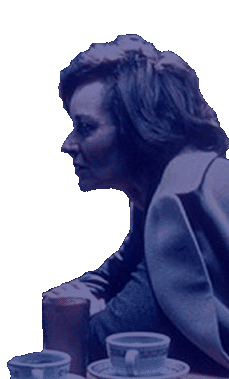
|

 |
|
About film |
||||||
|
"SUNDAY" is a social-psychological drama by first-time film director Jonathan
Nossiter. Madeleine is a British actress living in Queens, NY. Once upon a time she lived in London and was a successful member of the Royal Shakespeare Company (RSC). Now she's forgotten. She lives in a standard row house along with her estranged husband Ben (they're separated) and their adopted Korean daughter Suki. As the film opens she has just been offered the role of a mutant zombie in a low-budget horror movie. "I guess I'm too old to play a human being," she bitterly tells Oliver. The only pastime she can devote herself to is collecting half-dead plants. Her present life is empty and seems unreal for her, like a dream. Oliver is an unemployed middle class tax accountant. He worked many years for IBM, had a home and a wife, but lost both through a sudden lay-off and inability to find work. Now he lives in a homeless shelter, where most of its inhabitants despise him. During the days he wanders pointlessly along the streets, waiting for the time to go to bed. Nobody needs him. He is a paunchy, balding, miserable man who wears thick glasses. He has no hope for the future, no illusions, his life contains no events or positive emotions. On a bleak winter Sunday these two meet by chance. Madeline mistakes Oliver for Matthew Delacorta, the famous film director. Though we never quite know whether she really believes that he is Delacorta, she probably consciously builds her fantasy around him. Oliver takes the role of Matthew Delacorta upon himself. He is so lonely and unhappy that he needs to escape from depressing reality, if only for a day. But Madeleine likely needs the same. They actually cling to each other to feel love and achieve any degree of intimacy, to express tenderness to someone. As the day wears on it becomes clear that Oliver's true identity is unimportant to Madeleine. She believes what she needs to believe. He tries to tell her a story about his morning in the shelter, but she takes it as a strange entertaining story of the famous film director. When he leaves his coat behind at her house, she finds his wallet but makes no attempt to look inside and discover his true identity. When he mispronounces the title of the real Delacorta's famous film, Diversion, by calling it Devotion, she dismisses this mistake. Finally, when they cross paths with Oliver s fellow homeless companions and they greet him as Oliver, she decides (or pretends to decide) that Matthew is living in a shelter to do research for a movie he is making about a homeless man. Later, in a restaurant, she confesses to him that her real life is like a dream, but her meeting with him feels "perfectly natural and ordinary." Even by the end of the film we never know what the truth is. There's no denouement at all, when Madeleine would have made sure about "Matthew's" false identity. Instead, we see and feel their despair as they desperately try to make the intimate moments stand still. It becomes clear in shower scene: there's no passion in their embrace and kisses, only despair and tenderness. The end of "Sunday" is strange for the ordinary love story. It is twilight, and Oliver makes a decision to stay with Madeleine for the sake of one more moment of intimacy, knowing that he is breaking the shelter s curfew and will be locked out. He leaves Madeleine's house late at night, seeming to go nowhere at all. Sunday is over, another bleak Monday begins. Besides the main plot, there are out-of-plot sequences of the same day that depict the activities of the other homeless men. Selwyn tries to open an old chest found in a junkyard, Chen Tsun Kit sings karaoke opera on a subway platform, Abram shivers on highway overpass, writing something in Arabic, Ray stares at the windows of sex-shops and masturbates on a park bench. Many critics considered these scenes as pretentious, unnecessary features of Nossiter's style. But if one views these sequences in a symbolic way, it becomes clear why the director included them. Most of the viewers would see "Sunday" as a very dark, pessimistic and even cynical social melodrama. It has no denouement, no happy ending, the atmosphere of "Sunday" is incredibly bleak. But this is a misunderstanding of the entire conception of the film. "Sunday" is a very optimistic film because its protagonists are strong enough to stay alive and to preserve their dignity. They have strength not to lose their ability to feel love and to express tenderness even in desperate and painful times. They are past youth and have lost the meaning of life and the privileges of social status--but they still can dream and make decisions. This is a very optimistic idea. The best part of "Sunday" is the dialogue between Madeleine and Oliver. They talk in restaurants, in Madeleine's house, in her car... The central moments of the film are within Oliver's and Madeleine's monologues in her townhouse. Oliver tells the story about his morning in a shelter, as if it were the story constructed by Matthew Delacorta's imagination. Then Madeleine tells him about meeting a "fat, bald, miserably looking" man whom she decides to pick up to make her monstrous husband angry. We never know whether it's a true story or a construct of her imagination. If you like films with lot of action, tidy endings and clear characters' motives, "Sunday" is definitely a must-miss film for you. But if you like complicated, intelligent, stylish and smart dramas with obscured motives, psychological mysteries you must analyze a lot to understand, films making you think about certain human issues, you must see this film! |
||
|
If you would like to discuss Sunday, E-Mail Adelka Sundaymaniac |